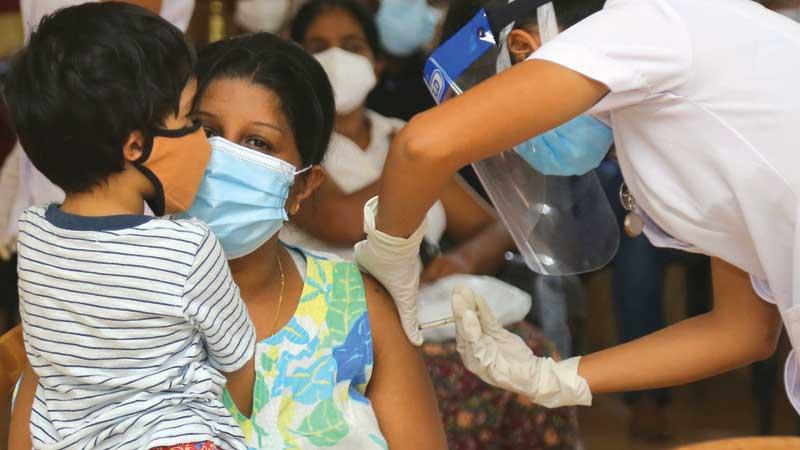
As the search continued for Astrazeneca vaccines to complete the initial inoculation cycle, the Government accelerated the deployment of other vaccines to boost immunity among the people.
The enthusiasm among people for Covid-19 vaccination reached new heights last week as state health officials warned the Covid-19 numbers could reach up to a million within 100 days.
Multiple officials in the health sector including the State Minister Sudarshani Fernandopulle warned, if the current rate of the spread is not contained the country will soon see a situation like in India.
Deputy Director General Health Services, Dr. Hemantha Herath said the Covid-19 positive cases were increasing by two-fold every five days and if this trend continues, in the next 100 days the numbers could rise up to a million.
Deadline
As the enthusiasm among people soared and the stocks of vaccines fast depleted, State Minister Channa Jayasumana announced a consignment of 185,000 doses of Sputnick V vaccine would arrive in Colombo on Tuesday.
The Government is expectant that an additional 600,000 doses of Astrazeneca will be received before the 12-16 week deadline lapses in June for those who received the vaccine earlier.
President Gotabaya Rajapaksa held a telephone conversation with the World Health Organization (WHO) Chief Tedros Adhanom Ghebreyesus, a week ago seeking the organisation’s intervention to boost the domestic vaccine drive and secure a consignment of Astrazeneca doses from countries which are either not using it in their local inoculation processes or having excess doses.
 Close on the heels of the phone conversation the WHO approved the Chinese vaccine Sinopharm for emergency use and Sri Lanka began rolling out the Sinopharm vaccine, of which the country had nearly 600,000 doses in stocks, received as a donation from the Chinese government.
Close on the heels of the phone conversation the WHO approved the Chinese vaccine Sinopharm for emergency use and Sri Lanka began rolling out the Sinopharm vaccine, of which the country had nearly 600,000 doses in stocks, received as a donation from the Chinese government.
Cabinet Co-spokesman Minister Keheliya Rambukwella said, on another front, the Government was negotiating with other governments including Australia and the UK to obtain some of their excess doses of Astrazeneca. These countries were reportedly having 4.5 million doses of the vaccine in stocks since they have decided to use only Pfiser and Moderna on their populations.
The WHO had called on the richer nations to donate more vaccines to their Covax program - the global Covid vaccine equity scheme. It appealed to the richer nations to stop vaccinating the less vulnerable young people and instead donate 20 per cent of their available supply through June, July and August for poorer nations. A research by UNICEF has found this would mean 153 million doses of vaccines.
Sri Lanka is to get 4.4 million vaccine doses to cover 20 per cent of its population through the COVAX facility. First 264,000 doses of vaccines under this program were deployed on the high-risk over 60 population. It is estimated that approximately 2.65 million of the country’s population are in this age category. The first round of allocations from the COVAX facility of 1.44 million vaccines will be provided in stages through May 2021.
Struggling
The WHO was expected to deliver its 65 million doses to struggling countries in the coming days but added it was behind schedule. The organisation should have delivered at least 170 million doses by now.
“By the time G7 leaders gather in the UK next month, and as a deadly second wave of Covid-19 will likely continue to sweep across India and many of its South Asian neighbours, the shortfall will near 190 million doses,” the WHO estimated.
“We have issued repeated warnings of the risks of letting down our guard and leaving low- and middle-income countries without equitable access to vaccines, diagnostics and therapeutics. We are concerned that the deadly spike in India is a precursor to what will happen if those warnings remain unheeded.”
The UNICEF has warned that the tragic situation in India is not unique and ‘cases are exploding and health systems are struggling in neighbouring countries such as Nepal, Sri Lanka and Maldives as well as in Argentina and Brazil.’ It said the cost for children and families will be incalculable.
The WHO has stressed the clearest pathway out of this pandemic is a global, equitable distribution of vaccines, diagnostics and therapeutics. “The longer the virus continues to spread unchecked, the higher the risk of more deadly or contagious variants emerging.”
The COVAX, led by the WHO, Gavi and CEPI, with UNICEF as the implementing partner, represents such a pathway but the facility is undersupplied.
The situation in India, a global hub for vaccine production, has augmented domestic demand for vaccine and this has meant that 140 million doses intended for distribution to low- and middle-income countries through the end of May cannot be accessed by COVAX. Another 50 million doses are likely to be missed in June, UNICEF revealed.
It has appealed for Covid-19 vaccine patent waivers and technological transfers, as a long term solutions to fight the pandemic but stressed that sharing excess doses was an essential emergency ‘stop-gap’ measure.
Dose
By last Tuesday (May 18), Sri Lanka has vaccinated 925,242 with Covishield (Astrazeneca), 424,823 with Sinopharm and 14699 with Sputnik V under its domestic inoculation drive. A total of 292,457 have been given the second dose of Covishiled vaccine.
Nearly 150,000 of positive cases have been reported in the country with over 1000 deaths by May 18. In the fish market cluster, which was the biggest cluster reported so far, over 82,000 were infected with the deadly disease. Over 47,000 infections have been recorded after the April New Year. According to Epidemiology Department statistics, over 120,000 have recovered so far while there are over 23,000 currently in hospitals.
